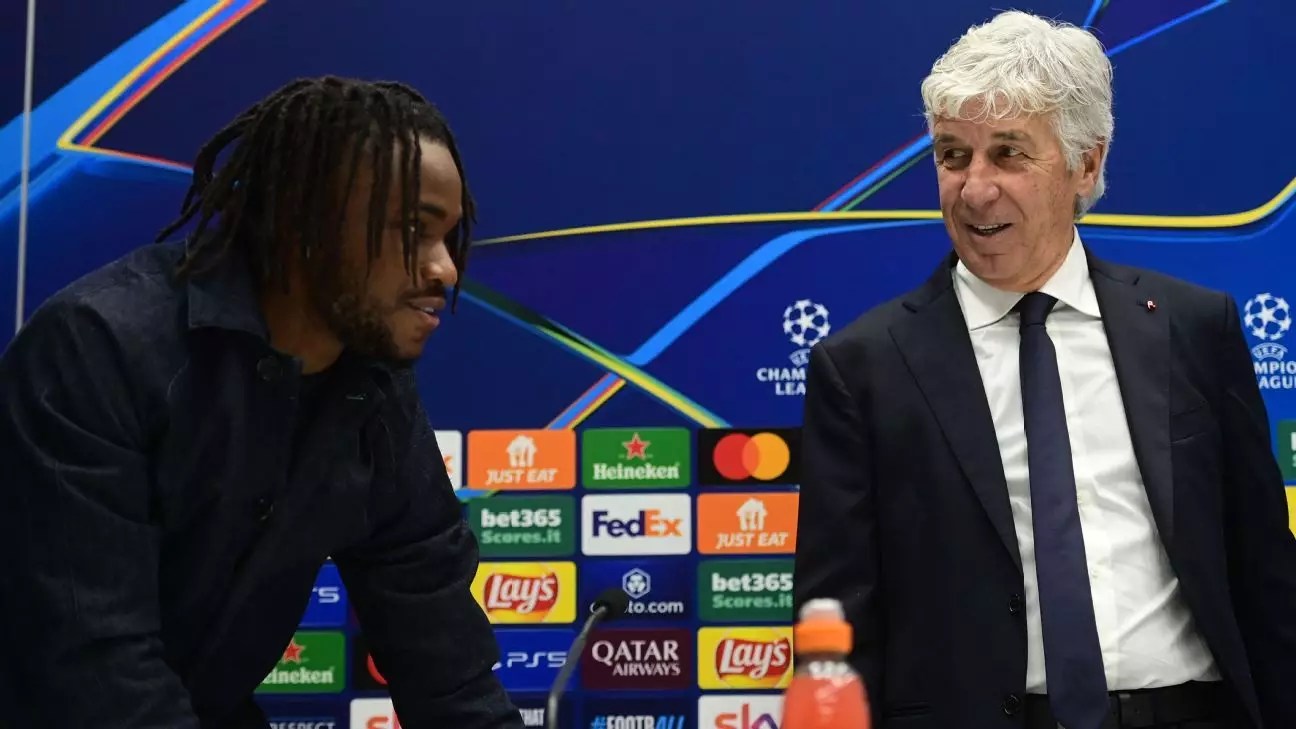In the high-stakes world of elite football, pressure can turn triumph into despair in the blink of an eye. The recent Champions League clash between Atalanta and Club Brugge served as a stark reminder of this reality. With the stakes high, Atalanta found themselves reeling from a 3-1 defeat, leading to a 5-2 aggregate elimination from the tournament. The match was characterized not just by the result but also by pivotal moments that would leave lasting implications on player morale, particularly Ademola Lookman, who faced the brunt of criticism from manager Gian Piero Gasperini.
Lookman, despite scoring Atalanta’s solitary goal, had a noteworthy misstep that became a focal point of post-match discussions. After being awarded a penalty, he stepped up to take the shot, which was ultimately saved by Simon Mignolet, the Brugge goalkeeper. The moment became contentious as Gasperini publicly lambasted Lookman’s penalty-taking competencies, indicating that the forward was ill-equipped for the responsibility. His harsh remark, branding Lookman as “one of the worst penalty takers” he had encountered, echoed through the media and among fans alike.
This incident elicits a broader discussion about the nature of accountability within sports teams. It’s commonplace for managers to assess and critique performances, yet Gasperini’s comments shifted the focus from a collective failure to an individual blame game.
After a profound disappointment, Lookman took to social media to express his feelings regarding the situation. His response reflects a deeper unease with how blame is apportioned in high-pressure scenarios. Lookman articulated that being singled out for criticism was not only painful but also felt disrespectful given his ongoing commitment and hard work for the team and the city of Bergamo. His disappointment is magnified by the fact that he has chosen to endure many struggles silently, prioritizing the spirit and unity of the team above his own grievances.
In his heartfelt message, Lookman emphasized that as a player, being held accountable is part of the game. However, the manner in which Gasperini singled him out clashed with his intrinsic values of teamwork and collective responsibility. “Life’s about challenges and turning pain into power,” he concluded, suggesting he is focused on overcoming the setback instead of being bogged down by it.
Leadership and Accountability
The incident further unveils the threads of leadership within the club. Atalanta’s captain, Rafael Tolói, faced his share of scrutiny after receiving a red card for a rash challenge. His indiscretion, coupled with Lookman’s penalty miss, led to a whirlwind of questions regarding discipline and accountability among players. Gasperini’s comments towards both players highlight a coaching philosophy that expects not only performance but also decorum and rationality in the heat of competition.
What this says about team dynamics cannot be understated. The complexities of leadership are often magnified under pressure, and how players like Tolói and Lookman navigate criticism can define not only their careers but also the future of the team. This particular instance underscores the importance of open communication among players and staff, creating a culture that emphasizes collective growth over individual blame, even in the wake of disappointing results.
The Bigger Picture
Ultimately, the drama surrounding Lookman, Gasperini, and their teammates serves as a microcosm of the broader challenges faced in professional sports. The intersection of personal ambition and team goals often leads to tense moments that can fracture relationships if not managed effectively.
As Atalanta moves beyond this setback, the onus will be on both the management and the players to foster a culture that supports resilience and growth. Clear communication is paramount, as is the understanding that while accountability is essential, it should not come at the cost of individual morale or team spirit. The journey towards overcoming obstacles is a shared one, and navigating this journey requires unity and understanding from all involved.


Leave a Reply